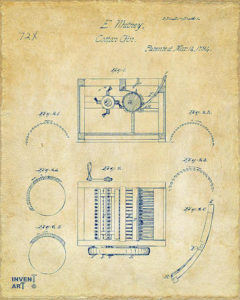
Cotton Gin (blueprint copy)
*On this date in 1794, white-American Eli Whitney patented the Cotton Gin he invented (or did he?).
Because they were not citizens, Black African slaves could not register any invention with a patent. Their owners could not register a slave's invention either since the law required that the patent be issued to the actual inventor. Consequently, any free person wanting to patent something could not acknowledge any contribution from a slave. Thus, it was easy to steal a slave's ideas and patent them.
Whitney was a significant early American inventor, pioneering mass production techniques that included the cotton gin. As a white Yale College graduate working in Georgia as a private tutor to pay off his educational expenses, Whitney saw a need for a machine to ease the process of removing seeds from blossoms of short-staple cotton, the only type that could be grown inland. Patented in 1794, the cotton gin made farming cotton profitably far from coastal areas possible. The profits did not, however, trickle down to Whitney himself; instead, because of a proliferation of imitations, the U.S. Patent Office refused to grant Whitney a patent renewal in 1807.
The cotton gin was a machine designed to remove seeds from picked cotton. Before using the cotton gin, it took a very long time to separate the seeds from the fibers by hand. Working hard, one could only clean about a pound of cotton daily. Whitney has been charged with borrowing the idea for the cotton gin from a simple comb-like device that slaves used to clean the cotton. Whitney is said to have merely enlarged upon the idea of the comb to create the cotton gin, which works like an oversized comb culling the seeds and debris from the cotton.
Whitney may have borrowed the idea, which, though valuable, was still incomplete. He may have used the principle behind the slaves' device and applied it to the broader problem of cleaning large quantities of cotton. Another historian writing about the issues facing African American inventors has noted: "Whether slave or free, the Negro could not proceed far in matters requiring the sanction of government except under the tutelage of some white man. Often what the Negro actually developed was exploited by the white man by whom he was employed or through whom he endeavored to find recognition."
So, while historians have accepted the theory that Eli Whitney's cotton gin idea came from an African slave, this claim remains impossible to prove. The Cotton Gin patent # is 72X.
History.com
Portia James, in The Real McCoy:
African American Invention and Innovation, 1619-1930.
Dorothy Yancy: "Four Black Inventors with Patents," Negro History Bulletin 39 [1976]: 574.Created Equal The Lives and Ideas of Black American
Innovators
By James Michael Brodie
Copyright 1993, by Bill Adler Books, Inc.
William Morrow and Co. Inc., New York
ISBN 0-688-11536-5